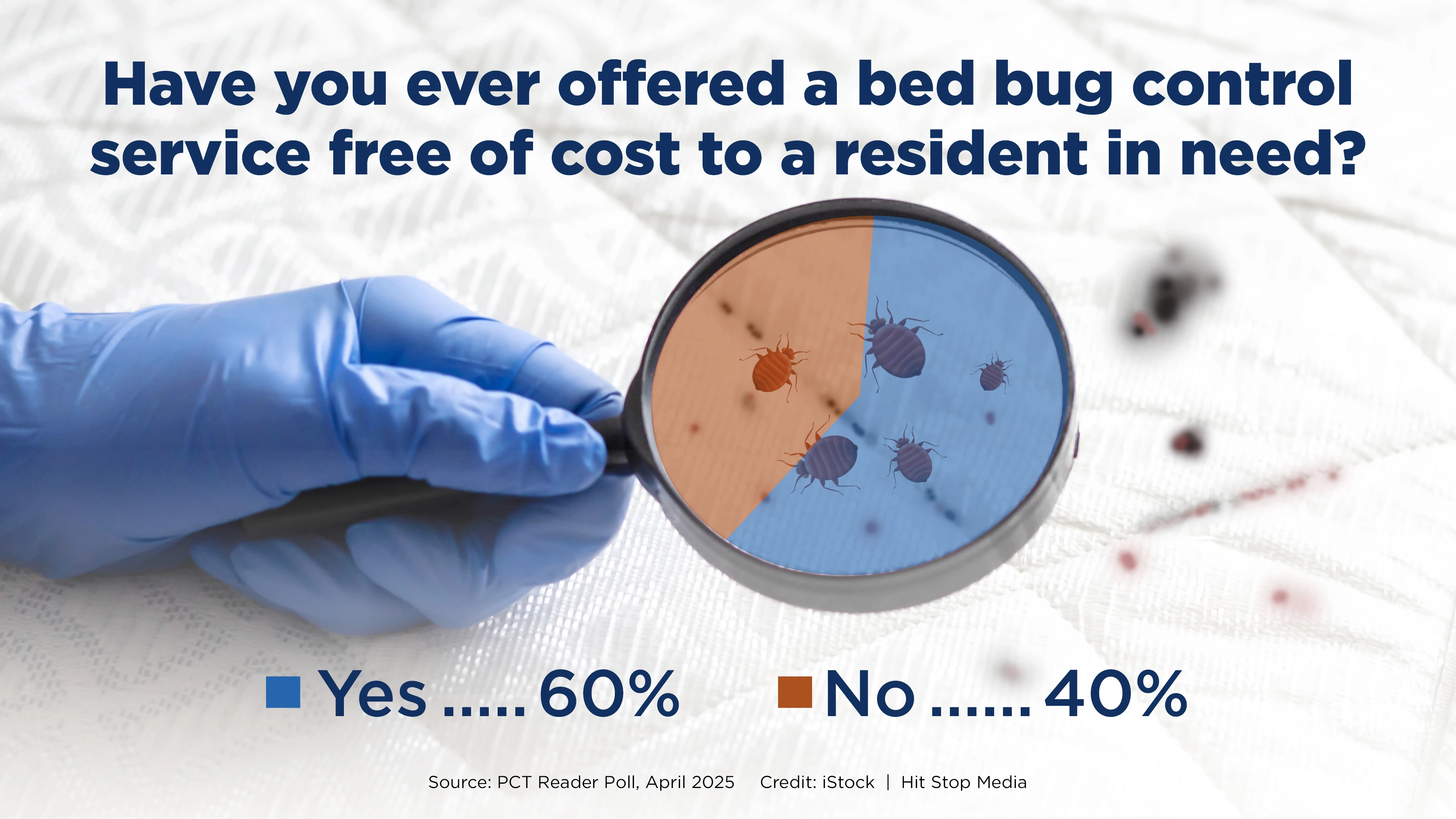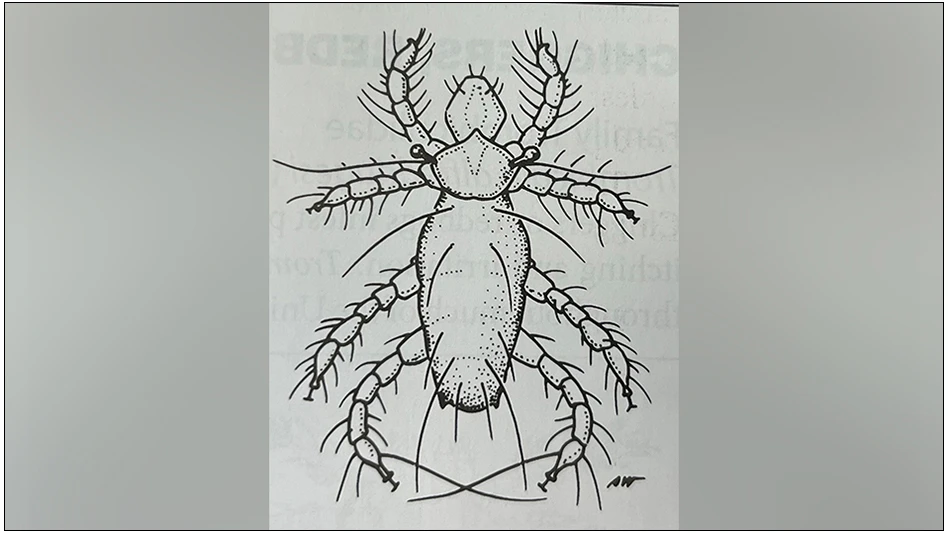
By Ed DeMask
Pest management professionals come from all walks of life. Some are “born” into the industry as second- or third-generation professionals; some come from a related field like lawn care; and others end up in pest control simply seeking a new job and a change. Then there’s Patrick John, who spent 21 years in the culinary arts field and decided he wanted a new challenge.
John, who has spent most of his life as a Wisconsin resident, took a job with Wil-Kil Pest Control as a residential technician seven years ago and hasn’t looked back. A year ago, he transferred to become a technical specialist in his company’s commercial division, overseeing large food-processing clients.
He credits his growth at the company to a strong work ethic and continually seeking educational opportunities. John is very aggressive when it comes to learning more about his craft, from internal training to state association classes to national accreditations.
“The biggest thing I did when I started at Wil-Kil was to learn as much as I could,” John said. “I took as much training and education as they allowed and I’m still trying to learn more. I took it to the extreme compared to other people. I’m just trying to learn as much as I can so I can be the best at my job.”
In all, John has taken 130 online courses at Wil-Kil, including Principles of IPM, Inspection Tools and Techniques, IPM Procedures and Documentation, Importance of Documenting Inspections, Setting Performance Objectives That Work and Sales is Not a Dirty Word.
Outside of Wil-Kil his studies include completing the Purdue Food Plant IPM course and studying to become an ESA A.C.E.-certified technician. In addition, he is a Wisconsin Pest Control Association (WPCA) Master Technician.
COMMITMENT & FOCUS. One of the reasons John is so well-liked by his clients and so successful at protecting their facilities from pests is his sharp focus when it comes to problem solving. While many technicians might take a “try this, try that” approach until a solution is found, John likes to get a problem solved as quickly as possible.
“I’m not a firm believer in ‘Let’s put a patch on that and see if it works,’” John explained. “For example, we found mice coming into a facility once, so I worked with my client to remove a small section of the wall so that we could find where they were coming in. When we got behind the wall we found that they were coming in through a hole behind the plumbing. We never would’ve seen it if we hadn’t done that. But we ripped it out and found the hole. I like taking the strongest step to find a solution rather than trying ‘Band-Aids.’”
According to Wil-Kil Regional Manager Terry Witter, who nominated him for Technician of the Year, John is the ideal type of professional for his position.
“He’s a guy who cares what he does and cares about the customers he services, and he has pride in what he does,” said Witter. “No matter what his day is like he comes in and has a smile on his face; works to help them; and has confidence he’ll do the right thing to put them at ease. Plus, his pride, care and commitment are all incredible.”
Witter has singled out John as the ideal commercial technician because he works well with corporate clients.
“Patrick represents the epitome of a business-to-business service technician in the pest management industry,” he added. “His ability to work with different personalities in multiple types of businesses is a direct result of his years of experience in customer service. He has an unyielding commitment to solve any problem he encounters and easily builds relationships with his clients.
“Also, whether it’s a client that needs him to be quick, efficient and get the job done, or a client who needs additional time to ask questions and really get detailed with their concerns, Patrick has the ability to read people and provide the exact service they desire.”
COMMERCIAL PESTS. Rodents are the biggest pest that John has to deal with — mostly because of the smell of food coming from a client’s food-processing plants. But good pest control practices can still do a great job preventing those rodents as well as other pests from reaching the food sources.
“We focus on rodent control and stored product pests for the most part,” John said. “We inspect incoming and outgoing loads; those guys can be anywhere. We look up high, down low, in conduit, you name it. Often, it’s construction workers that are guilty of leaving the doors open; they’ll put a door stop to hold the door open and that’s crazy. I cringe every time I see construction going on. I try to explain to them you can’t do that, and they say, ‘That’s what you’re here for.’”
Witter says John has been going above and beyond what normal commercial technicians do when providing pest control services. For example, he looks at how environmental controls play a role in pest prevention. When John is servicing exterior bait stations, he identifies if tree branches are within six feet of the structure and how a rock barrier should be maintained for pest prevention.
“Patrick also understands that sanitation is the first line of defense when it comes to food safety and pest prevention,” Witter said. “Sanitation eliminates the food, water, and harborage that support a pest population. Patrick understands that habitat modification is a must for both the inside and outside of facilities. Sanitation stresses the pests by taking away one of the three key items needed for life. He also understands that it’s not just people clean; it has to be pest clean.”
WHAT MAKES A GOOD COMMERCIAL TECH? While being a commercial technician can be dramatically different from a residential counterpart, John brings an unyielding focus that he believes is required of all commercial technicians in order to do the job properly.
“I believe there are always deficiencies in a building, even if it’s brand new,” he said. “My goal is to find a weakness, not to make you look terrible but if you find a hole over here, you have to document it. If it’s not documented, then it didn’t happen and then there’s no paper trail. I think people appreciate it, so instead of just verbal, there’s an actual paper trail saying, ‘Hey, we corrected this action,’ and they’ll thank you for following up. That’s what people need to do more often — physically pull people by the ear and show them things when they find something.”
But paperwork isn’t the only thing that makes a good commercial technician — it’s just a big part of it. The QA managers and their auditors require a lot of documentation and the more a pest control technician can provide — in real-time — the better the service you’re providing.
Some of the other elements necessary to provide good commercial service are more human, he says.
“I follow up a lot, I ask a lot of questions and I definitely smile a lot,” he said. “You put that happy face on even though I know it’s hard to do sometimes. If you’re smiling and they see you smiling, it puts them at ease. They’ll know I’m in a good mood and sometimes we’ll talk for a while before I go into the building to service. That takes their mind off other things and makes it easier for us to work together. Once you earn their trust, they open the doors up for you.”
HAPPY CUSTOMERS. John’s reviews from some of his commercial customers read like a glowing list of positive vibes, the kind he says he tries to emit every day when with his clients.
One Wisconsin food processor who works closely with John said he has been an incredible asset. “Patrick has been my technician for the three years I have been at (company name withheld) and he has been an incredible asset. He is always professional and is proactive in his approach to pest control. He goes above and beyond to assure that our pest control needs are taken care of. With his commitment to service, we continue to have our pest control needs met, and he has made us better in terms of having a more positive outlook to pest control, instead of being reactive.”
Another large client praises John for his commitment to documentation and pest control reports: “All of our documentation in the pest control binder is always in good order with the proper training, sign-offs and credentials. Our auditor was thoroughly impressed with the pest control program we had in place and said it was the best he had ever seen.”
A third customer praises John for his pest control expertise: “He is always on the lookout for possible entry points for insects and bugs and alerts us, so we can fix issues. His attention to detail and persistence at our plant has meant no rodent entry or infestations inside the plant since he has been working with us. Patrick is informative and responds quickly to our needs at the plant. His efforts and contributions to keep our facility pest free helps us produce a great quality product.”
The author is a PCT contributing writer.Get curated news on YOUR industry.
Enter your email to receive our newsletters.
Explore the December 2018 Issue
Check out more from this issue and find your next story to read.
Latest from Pest Control Technology
- Target Specialty Products, MGK Partner for Mosquito Webinar
- Cockroach Control and Asthma
- FORSHAW Announces Julie Fogg as Core Account Manager in Georgia, Tennessee
- Envu Introduces Two New Innovations to its Pest Management Portfolio
- Gov. Brian Kemp Proclaimed April as Pest Control Month
- Los Angeles Ranks No. 1 on Terminix's Annual List of Top Mosquito Cities
- Kwik Kill Pest Control's Neerland on PWIPM Involvement, Second-Generation PCO
- NPMA Announces Unlimited Job Postings for Members






